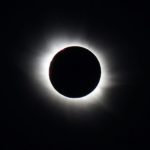South Carolina Road Trips For The Eclipse
By • August 9, 2017 0 943

The universe is full of incredible phenomena that never fail to leave us amazed and awestruck. From distant stars and planets to ominous black holes, outer space is home to the weird and unknown.
On Monday, Aug. 21, observers anywhere along the “path of totality” from Salem, Oregon, to Charleston, South Carolina, will be able to witness the first coast-to-coast total solar eclipse in nearly a century, dubbed the Great American Eclipse of 2017.
An eclipse occurs when one heavenly body, such as a moon or a planet, moves into the shadow of another heavenly body. During August’s solar eclipse, our moon will block the light of the sun from reaching Earth, casting a shadow onto the surface of our planet. The eclipse will begin about 1:15 p.m. and last until 4:15 p.m.
Eclipse-related events will be held in many locations. One of best places to take part in the fun is Charleston, South Carolina. It’s a bit of a drive (about eight hours from D.C.), but if you’re fascinated by the wonders of the universe, this road trip is right up your alley.
Viewers in Charleston can see totality of coverage for approximately one minute and 33 seconds — a brief but historic payoff. Thousands of visitors from the surrounding states are expected.
With more than 100 events listed on the Go Dark Charleston website, there is certainly no shortage of places to see the Great Eclipse. Patriots Point Naval & Maritime Museum and ABC News 4 have joined together to host “Eclipse on a Warship” aboard the USS Yorktown, an all-day affair with presentations and children’s activities leading up to the eclipse.
Eclipse fans are also to invited take part in a family-friendly event at the Medical University of South Carolina Health Stadium, where there will be astronomy-related programming, a science-based kids zone, local food and drink and entertainment. Tickets are $8 for adults and free for children age 12 and under, military personnel and first responders.
Another great place to watch is Georgetown, South Carolina. Stroll along the downtown boardwalk and Front Street or lounge in a downtown park or East Bay Park to make the most of your viewing experience. Events will be held all afternoon to celebrate the eclipse. Viewers are encouraged to bring chairs and blankets to relax and watch on the lawn of the Kaminski House Museum, located at 1003 Front St. in historic downtown Georgetown.
For a sandy approach to the day, grab your towel, sunscreen and umbrella and drive down to Myrtle Beach, South Carolina. The total solar eclipse will not be visible from this location, but the moon will cast a significant shadow since the sun will be partially covered, with maximum coverage at 2:47 p.m.
You can also dip your toes in the cool Atlantic waters of Kiawah Island, South Carolina, just a short drive from the best places to view the eclipse in Charleston. Turn your eclipse viewing into a full-blown vacation by staying at one of the many highly rated golf resorts on the island. Known for its difficult courses and luxurious amenities, this is the perfect place to indulge a little while working on your game. A few favorites at the Kiawah Island Golf Resort include the Ocean Course, named the number four public golf course in U.S.; Oak Point Golf Club, which values thought and precision over power; and Turtle Point, which was recently renovated and reopened in October of 2016.
Make your way toward the lakeside in Anderson County, South Carolina. Community members will be participating in an Electric City Lights Out Festival the night before the eclipse from 5:30 to 7:30 p.m. on Federal Street. The festival will celebrate with local products, food and drink and entertainment. On Aug. 21, watch from the shores of Lake Hartwell for an unobstructed view.
- Eclipse


